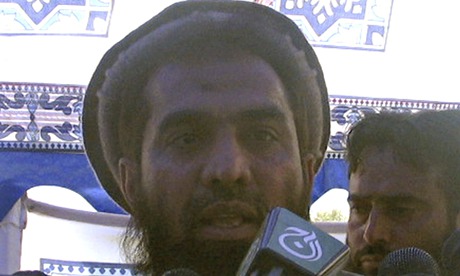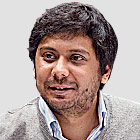'People will forgive you for being wrong, but they will never forgive you for being right - especially if events prove you right while proving them wrong.' Thomas Sowell
Search This Blog
Showing posts with label Hafiz. Show all posts
Showing posts with label Hafiz. Show all posts
Saturday, 26 November 2022
Friday, 19 December 2014
Yes, Pakistanis are united against terrorism. But not on terrorists
Militants who target India will always be good Taliban. So an alleged architect of the Mumbai attack can be released two days after Peshawar

On this Pakistan is united: the men who killed 132 children in a Peshawar school are terrorists. On this too Pakistan is – temporarily – united: terrorism must be defeated. After that the trouble begins. With something as seemingly innocuous as who, exactly, is a terrorist. Pakistanis can’t seem to agree.
Neither can the media. A day after the Peshawar carnage, after the Pakistan army had announced that the slaughter in the school had been operationally coordinated by Afghan-based Pakistani militants, an outraged analyst on local TV asked what the world’s response would have been had India been attacked by militants from Pakistan.
India, the analyst claimed indignantly, would be contemplating bombing Pakistan and the Indian army would already have been mobilised on the Pak-India border. The world at large, the analyst continued, would have pounced on Pakistan for its terrible behaviour. But, the analyst lamented, because Pakistan is weak, it could do no more than send its army chief to Afghanistan and politely seek the Afghan government’s cooperation.
For many in Pakistan, the analyst’s anger would have resonated. His fulminations against the international community’s perceived discrimination against Pakistan would have garnered much sympathy. To much of the outside world, the analyst’s comparison would have triggered incredulity.
For exactly that scenario – Pakistanis slipping into India to mercilessly kill civilians in a major city – had infamously already occurred. In Mumbai. In 2008. Had the TV analyst simply forgotten? Surely not.
But there the analyst was, on one of Pakistan’s most popular news channels, suggesting that the world does not share Pakistan’s pain. Unsaid, though not uncommunicated, was a darker theory: Pakistan is a victim of an international conspiracy, an innocent victim of geopolitics, alone and vulnerable in a Hobbesian world full of militant proxies.
Ultimately, Pakistan’s problem with militancy is not denial. It is not even ignorance. It is something quite different. Simply, it is the widespread belief that militants fighting the Indian state, militants fighting to free “Indian-held Kashmir”, militants fighting the Afghan government and militants fighting to “free” Afghanistan are not militants. They are the good guys. The righteous ones brave enough to take on the world in the name of the one true God.
The problem was never denial. The problem is the paradigm. The Afghan Taliban are not militants. Lashkar-e-Taiba – LeT –are not terrorists. And, even more insidiously, there are those within Pakistan who do not believe that Tehrik-i-Taliban Pakistan is in the wrong.
Instead, the belief is that the Pakistani state itself is on the wrong path. A democratic path. A path that keeps it in thrall to American, godless, anti-Islam interests. A path that takes Pakistan far from that of the religion in the name of which it was ostensibly created.
That’s really why it’s possible for Pakistan to stun the outside world – two days after the horror of Peshawar – by granting bail to one of the alleged architects of the Mumbai attack, Zaki-ur-Rehman Lakhvi of the officially banned LeT. That’s why it’s possible for Pakistan to confound the world by rejecting global sympathy over the Peshawar attack and embracing LeT instead.
The Lakhvi bail is not a surprise. In truth, it is the inexorable outcome of recent events in Pakistan. Consider just what happened in Lahore, the provincial capital of Punjab and the heart of political power in Pakistan, on 4 December.
Imran Khan, the leader of Pakistan Tehreek-e-Insaf (PTI), had been trying to oust the government of Nawaz Sharif via street protests since August, and threatened to shut down Lahore that day. But within hours of Khan’s announcement on 30 November, the PTI appeared to realise it had made a mistake: the Jamaat-ud-Dawa, a hardline Islamist organisation, was holding its annual congress in Lahore on 4 and 5 December. And so the PTI quickly postponed its protest.
Pause on that for a moment. The business of toppling a national, elected government had to take a back seat to the annual Lahore pilgrimage of Hafiz Saeed, the chief of Jamaat-ud-Dawa. It was perhaps inevitable. With the Narendra Modi government in India taking a hawkish line on Pakistan, pro-Kashmir, anti-India jihadis in Pakistan were always going to take centre stage.
There is though at least one thing that Pakistan remains wilfully blind to. Every single one of the militant groups fighting the Pakistani state today was once at some point in recent history considered to be a good militant/good Taliban. Just like Hafiz Saeed is today.
Sunday, 3 February 2013
Questions for Hafiz Saeed/Pakistan
by M J Akbar
A question for the internationally recognised terrorist, ideologue and mastermind of the 2008 Mumbai attack, Hafiz Saeed, resident of Lahore, who has just offered sanctuary in Pakistan to our superstar Shah Rukh Khan. Pakistan was carved out in 1947 to ensure security for this subcontinent's Muslims in a separate homeland. Why, six decades later, has Pakistan become the most insecure place for Muslims in the world? Why are more Muslims being killed each day, on an average, in Pakistan than in the rest of the Muslim world put together?
This continual mass murder is not being done by Hindus and Sikhs, who were once proud residents of Punjab and Sindh but are now merely a near-invisible trace. Some Pakistan leaders even express pride in the fact that non-Muslims , who constituted around 20 per cent of the population in 1947, have been reduced to less than 2 per cent. In contrast, the percentage of Muslims in secular India has increased since independence. Hindus and Sikhs are not killing Muslims in Pakistan; Muslims are murdering Muslims, and on a scale unprecedented in the history of Punjab, the North West Frontier and Sindh. Why?
There have been riots in India, some of them horrendous. But the graph is one of ebb from the peak of 1947. When a riot does occur, as in Maharashtra recently, civil society and media stand up to demand accountability, and the ground pressure of a secular democracy forces even reluctant governments to cooperate in punishment of the guilty. When Shias, or other sectarians, are mass-murdered in Pakistan on a regular basis, the killers celebrate a "duty" well done.
History's paradox is evident: Muslims today are safer in India than in Pakistan. The "muhajirs" who left the cities of Uttar Pradesh and Bihar in 1947 would have been far safer in Lucknow, Patna and dozens of cities in their original land than they are now in the tense streets and by-lanes of Karachi.
Could Shah Rukh Khan have become an international heart throb if his parents had joined the emigration in 1947? Since he is talented he would have gained some recognition on the fringes of elite society, but he could not have become a central presence of a popular culture that has seeped and spread to every tehsil and village. Nor is Shah Rukh the only Muslim superstar in Mumbai's film world; Salman Khan is bigger than him. Shah Rukh and Salman and Amir Khan do not hide their identity through an alias; their birth name is their public persona.
The television set in my office serves two main purposes: it shows cricket and offers access to an FM radio station which plays old film songs. A song by Muhammad Rafi was on the air while the previous paragraph was being written: Man re tu kahe na dheer dhare. It is a beautiful classic, written by Sahir Ludhianvi. Rafi, as his name confirms, was a Muslim. He was born in 1924 in western Punjab and came to Mumbai as a very young man in search of dreams. Those dreams had not come true by 1947. Rafi had the option of returning to Lahore. He chose to remain in Mumbai, and brought his family in what might be called the reverse direction. It was a wise choice. Mumbai made Rafi's voice immortal. Rafi, like India, was the distillation of many inspirations.
Hafiz Saeed and his ilk possess cramped, virulent minds which condemn the ragas upon which our subcontinent's music, both classic and popular, is based, as inimical. They want to destroy a shared Hindu-Muslim cultural heritage in which Muslim maestros took classical music to splendid heights under the patronage of padishahs, rajahs and nawabs . Instead of art, they possess vitriol, even as the violence they spawn turns Pakistan into a laboratory of chaos. They call themselves guardians of their nation, but they are in fact regressive theocrats who are shredding the Pakistan that Jinnah imagined.
There is an answer to the opening question. Extremists who reduce faith to a fortress do not understand a simple truth: faith cannot be partitioned. Islam was a revelation for mankind; it cannot be usurped by a minor tract of geography. Nations are created by and for men, within boundaries of language or culture or tribe. Religion comes from God; it is not a political tool for human ambition. Those who equate religion with nation distort the first and destroy the second. Pakistan has become a battlefield for dysfunctional forces because theocrats will not permit it to become a rational state.
Logic suggests a reciprocal offer: Pakistani Muslims would be safer in India. But that offer cannot extend to Hafiz Saeed. His mission is to be India's adversary. What he does not understand is that he is really Pakistan's enemy.
Subscribe to:
Comments (Atom)
